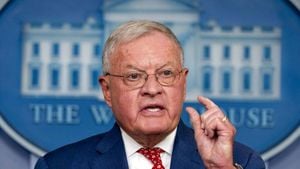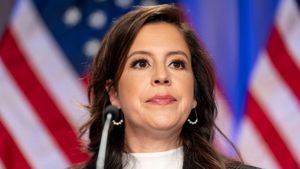President-elect Donald Trump has proclaimed success on the immigration front following his recent discussions with Mexico's President Claudia Sheinbaum. The correspondence, which unfolded at Trump’s residence in West Palm Beach, Florida, allows Trump to trumpet his claim of coaxing Mexico toward more stringent measures against illegal immigration. Yet, his optimism may not be entirely aligned with Mexico's stance, as Sheinbaum subtly hinted at Mexico already undertaking significant efforts without any intention of limiting its borders.
The timing of the call is notable, occurring just after Trump threatened to enact substantial tariffs on both Canada and Mexico. This action is part of his broader intentions to clamp down on illegal migration and drug smuggling from Mexico. "This was effectively closing our Southern Border," he asserted on his social media platform, referring to the outcomes of the conversation with Sheinbaum.
Trump suggested Sheinbaum had concurred to halt migration through Mexico—a point vigorously challenged by her subsequent comments. According to Sheinbaum's social media updates, Mexico has already been attending to the needs of migrant caravans and expressed her dissatisfaction with the notion of border closures. "Our position is not to close borders but to build bridges between governments and peoples," she stated, which suggests Mexico's commitment to maintaining open borders, contradicting Trump's claims of sweeping changes.
Further complicates the situation is the unclear status of Trump's proposed tariffs. While the implication of higher tariffs could potentially drive up costs for consumers and decelerate economic growth, Trump has emphasized the perceived effect of such threats as significant leverage. The prospect appears to resonate with Trump's supporters, who see the threatening of tariffs as part of his approach, promising more stern measures against immigration and drug trafficking.
Statistics reveal illegal migration across the U.S.-Mexico border has plunged, with controversial bilateral cooperation deemed partially responsible for this reduction. Since the peak observed in December, apprehensions at the border have diminished by about 40%. U.S. officials attribute this decrease to enhanced measures by Mexican authorities, who have intensified surveillance around key transit areas, including railroad yards and highways.
"Mexico is taking care of these caravans; they are not approaching the U.S. border," Sheinbaum explained, reinforcing the narrative of proactive management from her administration. The conversation also touched on collaborative security efforts aimed at thwarting fentanyl traffic—an issue Trump has underscored frequently, referencing the opioid crisis devastating American communities.
The looming threat of tariffs remains on the horizon, and should they become reality, it could have serial implications for the trade enacted under the United States-Mexico-Canada Agreement, established during Trump's earlier administration. Trump reiterated his promise to impose a moonshot 25% tax on imports from Canada and Mexico, coupled with another tax on materials originating from China tied to fentanyl production and distribution.
While the Biden administration has also utilized negotiation to fortify border management and fight drug trafficking, it remains to be seen how Trump's brand of pressure politics through fiscal threats will reshape the dynamic relationship with Mexico moving forward. Nonetheless, the exchange between the two leaders has reinstated Trump’s confidence about his approach to immigration, culminating in what he perceives as another triumph to share with his supporters.
With both nations poised on opposite ends of the conversation concerning immigration and border policy, the ensuing weeks will likely be pivotal. There’s much at stake not only for these leaders' legacies but also for the everyday lives of many trapped within the political machinations of immigration reform—a subject still heavily fraught with complexity and sentiment amid political battles.
Hussain contributed to this report from Associated Press along with Mark Stevenson from Mexico City.



